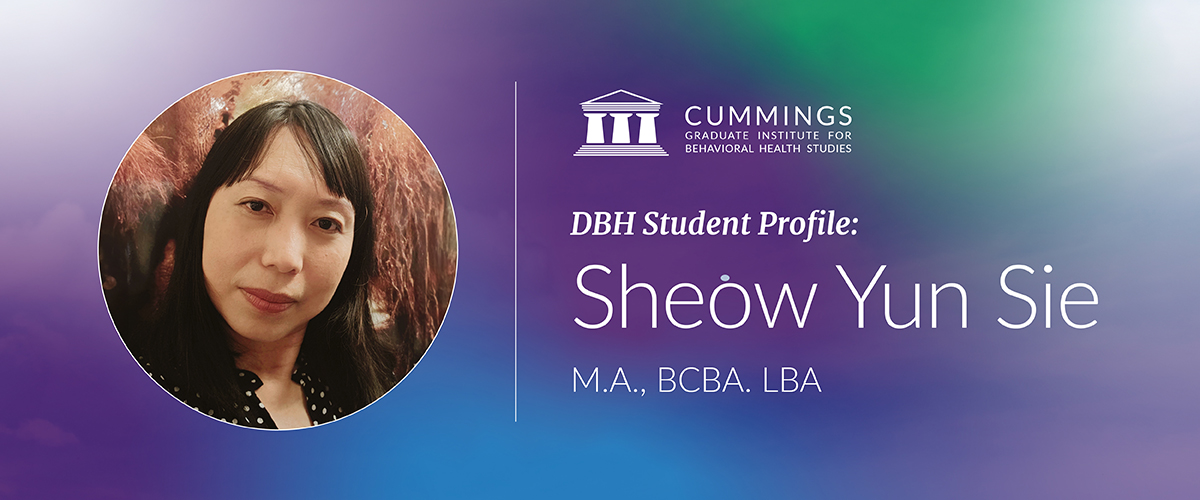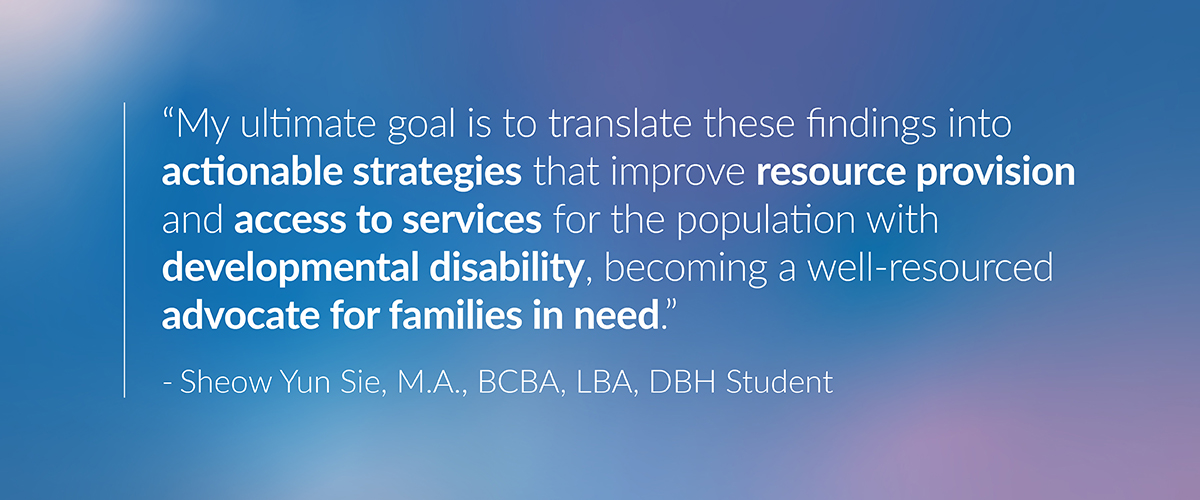From Advocacy to Impact: Sheow Yun Sie Leverages Lived Experience to Lead
Motivated by both personal experience and professional expertise, Sheow Yun Sie, also known as Kathryn, has dedicated her career to advancing behavioral health care and research. Her journey began with advocating for her son following his autism diagnosis, which inspired her to pursue deeper training and systemic change. Currently a Doctor of Behavioral Health (DBH) student at Cummings Graduate Institute for Behavioral Health Studies, Kathryn brings to her studies an M.A. in Applied Behavior Analysis from Queens College, CUNY, and extensive experience as a Board-Certified Behavior Analyst. In addition to developing treatment plans and supervising clinical staff, she serves as Clinical Research Coordinator at the Stress in Pregnancy (SIP) Lab at Queens College, where she investigates the impact of maternal stress on child development. Kathryn also extends her work beyond academia through a podcast series that translates complex research into accessible conversations. In this interview, she shares her community impact, the challenges she has witnessed firsthand, and her vision for advancing integrated care.
How are you using your behavioral health expertise to impact your local community?
In addition to my work as a contract behavior analyst, I actively contribute to the behavioral health field as a research coordinator at the Stress in Pregnancy lab at the City University of New York, Queens College. In this role, I manage a clinical laboratory with approximately 30 research assistants, helping to foster the next generation of researchers. I’ve also launched a podcast series featuring interviews about new research discoveries, which has successfully broadened its reach beyond academia to a general audience. To date, I’ve released four podcasts, with two more in production, making complex research accessible to the public.
- Unveiling Prenatal Stress and Early Signs of Suicidal Ideation: https://youtu.be/Do6gBkWPtyc
- Climate Change & its effect on our health and well-being: https://youtu.be/jXGB59W8jgo
- Heat and Hurricanes: How Prenatal Stress Shapes Young Brains: https://youtu.be/HuOuqlgJbAE
- Tiny Lungs, Growing Minds: How Air Pollution Shapes Early Development: https://youtu.be/U5WsSqDKX-Y
Furthermore, our lab’s recent publication by PhD student Donato DeIngeniis, ‘Prenatal exposure to extreme ambient heat may amplify the adverse impact of Superstorm Sandy on basal ganglia volume among school-aged children,’ has garnered significant media attention, highlighting critical public health issues. My direct experience as a behavior analyst, observing the challenges families face with limited resources and services for individuals with developmental disabilities, deeply reinforces my commitment to advocating for public welfare. This hands-on experience directly informs my research and motivates me to work towards improving support systems within our community.
What professional experience has most influenced your approach to behavioral health?
My experience with podcasting has significantly influenced my approach to behavioral health, as it has allowed me to reach a broader audience, including both professionals and the general public. This direct engagement helps bridge the gap between complex research findings and practical application, ensuring that vital information about behavioral health is accessible to those who can benefit most. This aligns with my aspiration to become a well-resourced advocate for families in need of support.
What challenge have you encountered in the behavioral health field, and how do you plan to address it?
One significant challenge I’ve encountered in the behavioral health field is the suboptimal provision of resources and access to services for individuals with developmental disabilities. This was a direct observation from my work as a behavior analyst, where I had direct contact with clients. In the future, I envision addressing this issue by leveraging my doctoral degree in behavioral health research to make significant contributions to the development of public health policies and interventions. My research focuses on the synergistic effects of prenatal exposure to environmental stressors and their impact on child psychopathology, and the influence of neighborhood disparities on child social skills, which is directly aimed at identifying risk factors and informing interventions. By understanding these complex interactions, I hope to advocate for more targeted and effective resource allocation and service delivery, providing crucial support to both mothers and their children.
Can you share an experience that shaped your understanding of integrated behavioral healthcare?
For the longest time, I’ve been dedicated to advocating for services and benefits for both my son and my clients. It has often been incredibly frustrating to see patients, such as my son or clients, having to reach out to numerous providers and organizations just to figure out how to advocate for their needs fully. I can only imagine the immense difficulty that less educated mothers face in trying to navigate such scattered services. This constant struggle for comprehensive support is what truly opened my eyes to the power of integrated care. It helped me better understand how to genuinely help people with a more holistic approach, moving beyond fragmented services towards a coordinated system that supports the whole individual and family.
How do you envision making a lasting impact in behavioral healthcare?
I envision myself making a lasting impact in behavioral health by becoming a well-resourced advocate for families in need of support, particularly those with children facing developmental challenges. My goal is to build on my experience and further specialize in maternal and child wellness, as well as healthy living. This means delving deeper into the complex interplay of genetic and environmental factors that influence child neurodevelopment. Understanding these factors is crucial for implementing early interventions before problems fully develop, enabling the identification of risk factors, biomarkers, and practical strategies to enhance the quality of life for individuals with developmental disabilities.
Through my doctoral studies at Cummings Graduate Institute for Behavioral Health Studies, I’m confident I’ll gain the expertise, knowledge, and skills necessary to contribute significantly to public health policies and interventions. These efforts will aim to lessen adverse impacts on vulnerable populations. My research, which explores the effects of external stressors like climate disasters and neighborhood disparities, and internal stressors such as maternal mental health challenges, directly supports this mission.
Crucially, my approach will be rooted in integrated care, recognizing that behavioral health doesn’t exist in a vacuum. I aim to contribute by promoting collaborative models that address physical and mental health synergistically. This involves establishing pathways for seamless communication between various providers, including pediatricians, therapists, social workers, and educators, to ensure a holistic view of each child and family. By integrating these different aspects of care, we can create more accessible, efficient, and ultimately more effective support systems, empowering families to navigate challenges with comprehensive, coordinated care.
What inspired you to pursue the DBH program?
My decision to pursue the DBH program is deeply personal, rooted in my son’s autism diagnosis in Malaysia and our subsequent move to the U.S. in search of better resources. This experience profoundly fueled my commitment to behavioral health and ignited a strong desire to become an effective voice for change, giving back to families navigating similar challenges. Initially, I pursued a master’s in Applied Behavior Analysis (ABA) to better understand and support my son. My introduction to clinical research at the Stress in Pregnancy (SIP) Lab further intensified my passion for this field. There, I gained exposure to various aspects of research project management, including securing funding, ethical oversight, and gathering information. I also developed a keen interest and aptitude for statistical processes and analysis, which I am eager to further develop.
My research projects, focused on the effects of various stressors on child development, culminated in a significant study that reinforced my passion for developmental research and highlighted the critical need for statistical expertise to translate ideas into practical solutions. The introduction to geographic information systems (GIS) further solidified my interest in using data to understand environmental stressors and their influence on quality of life, particularly for vulnerable populations. Ultimately, I believe the DBH program will enable me to combine my varied personal and work experiences. It will equip me to become the best-resourced advocate for families in need of support, making my life’s purpose a reality.
For Kathryn, the Doctor of Behavioral Health program represents more than an academic milestone, it is the bridge between personal experience and professional purpose. Her accomplishments reflect both determination and vision, transforming personal challenges into a mission that unites science, practice, and advocacy. From her work as a Board-Certified Behavior Analyst to her leadership in clinical research and her efforts to make knowledge accessible through podcasting, she has already made a meaningful impact on the field. With the added depth of the DBH program, Kathryn is poised to expand that influence even further, shaping policy, advancing integrated care, and building more equitable systems of support for families. Her story is a powerful reminder that personal passion, when paired with rigorous training, can drive lasting change in healthcare and inspire others to reimagine what is possible.
Connect with Sheow Yun Sie (Kathryn Sie)
Kathryn on Why She Chose the DBH
Learn More about Kathryn’s Research
Bridging Research, Advocacy, and Access
DBH Student, Sheow Yun Sie, Leverages Behavioral Health Expertise to Create Meaningful Change
As a behavior analyst and research coordinator at the Stress in Pregnancy Lab at City University of New York, Queens College, Sheow Yun Sie, M.A., BCBA, LBA, and Doctor of Behavioral Health (DBH) student at Cummings Graduate Institute for Behavioral Health Studies, is conducting groundbreaking research on how environmental and psychological stress impact child development and mental health. Her work examines the combined effects of external factors, such as climate disasters, and internal stressors, such as maternal mental health, on early childhood outcomes.
































